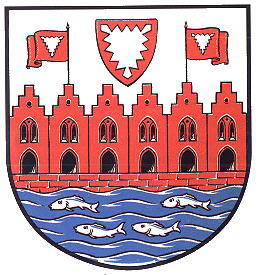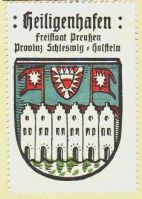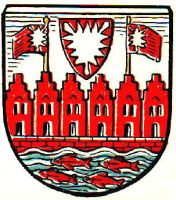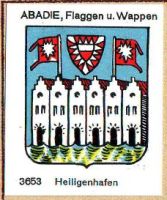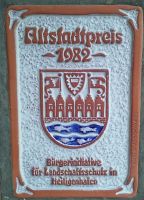Heiligenhafen
HEILIGENHAFEN
State : Schleswig-Holstein
District (Kreis) :Ostholstein (until 1970 Oldenburg in Holstein)
| German | In Silber über silbernen und blauen Wellen, in denen vier silberne Fische paarweise übereinander schwimmen, eine durchgehende rote Quadermauer; darauf sechs aneinandergereihte rote Giebelhäuser mit Toren und Uhlenloch, das zweite und fünfte besteckt mit einer roten Fahne, darin ein silbernes Nesselblatt; zwischen den Fahnen ein roter Schild mit silbernem Nesselblatt. |
| English | blazon wanted |
Origin/meaning
The arms were officially granted on August 27, 1987
The arms were first adopted in 1933 and are based on the oldest know seal of the city, known since 1355. The seal and the arms shows the city with above the houses the arms and the banners of the Counts of Holstein, who ruled the city at the time. The base is canting, Hafen meaning harbour, and symbolises the sea and the importance of fishing for the city.
Later seals showed a reduced number of houses and the fishes were removed. Later the sea was replaced by a green or blue base. In 1933 the old composition was restored.
Hupp showed in his books two versions of the arms; the first from around 1925 and the second as the proposal for arms in 1933. The latter is nearly identical as the final arms, but with different colours of the fish.
Image Gallery
The arms by Hupp in the Kaffee Hag albums +/- 1925
The arms in the Abadie albums
This page is part of the German heraldry portal Deutsche Wappensammlung |
Heraldry of the World |
|
German heraldry:
|
Selected collector's items from Germany:
|
Contact and Support
Partners:
Your logo here ?
Contact us
© since 1995, Heraldry of the World, Ralf Hartemink 
Index of the site
Literature: Stadler, 1964-1971, 8 volumes; Hupp, O: Kaffee Hag albums, 1920s
